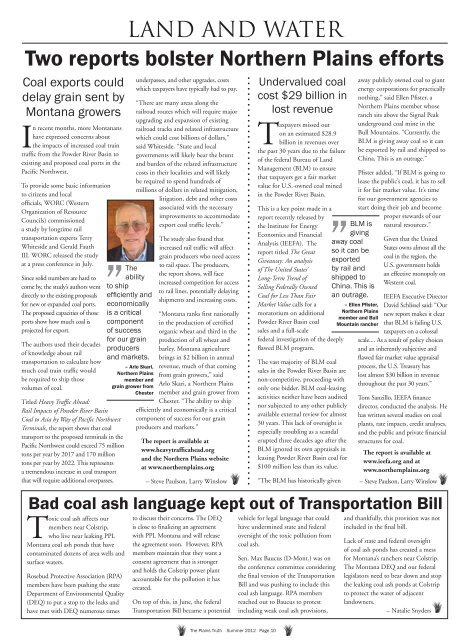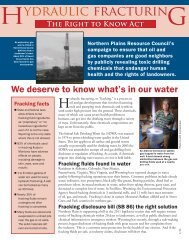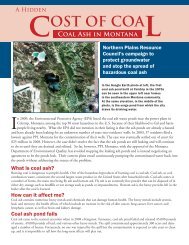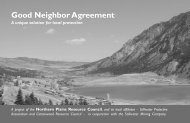Summer - Northern Plains Resource Council
Summer - Northern Plains Resource Council
Summer - Northern Plains Resource Council
You also want an ePaper? Increase the reach of your titles
YUMPU automatically turns print PDFs into web optimized ePapers that Google loves.
land and water<br />
Two reports bolster <strong>Northern</strong> <strong>Plains</strong> efforts<br />
Coal exports could<br />
delay grain sent by<br />
Montana growers<br />
In recent months, more Montanans<br />
have expressed concerns about<br />
the impacts of increased coal train<br />
traffic from the Powder River Basin to<br />
existing and proposed coal ports in the<br />
Pacific Northwest.<br />
To provide some basic information<br />
to citizens and local<br />
officials, WORC (Western<br />
Organization of <strong>Resource</strong><br />
<strong>Council</strong>s) commissioned<br />
a study by longtime rail<br />
transportation experts Terry<br />
Whiteside and Gerald Fauth<br />
III. WORC released the study<br />
at a press conference in July.<br />
Since solid numbers are hard to<br />
come by, the study’s authors went<br />
directly to the existing proposals<br />
for new or expanded coal ports.<br />
The proposed capacities of those<br />
ports show how much coal is<br />
projected for export.<br />
The authors used their decades<br />
of knowledge about rail<br />
transportation to calculate how<br />
much coal train traffic would<br />
be required to ship those<br />
volumes of coal.<br />
Titled Heavy Traffic Ahead:<br />
Rail Impacts of Powder River Basin<br />
Coal to Asia by Way of Pacific Northwest<br />
Terminals, the report shows that coal<br />
transport to the proposed terminals in the<br />
Pacific Northwest could exceed 75 million<br />
tons per year by 2017 and 170 million<br />
tons per year by 2022. This represents<br />
a tremendous increase in coal transport<br />
that will require additional overpasses,<br />
Toxic coal ash affects our<br />
members near Colstrip,<br />
who live near leaking PPL<br />
Montana coal ash ponds that have<br />
contaminated dozens of area wells and<br />
surface waters.<br />
Rosebud Protective Association (RPA)<br />
members have been pushing the state<br />
Department of Environmental Quality<br />
(DEQ) to put a stop to the leaks and<br />
have met with DEQ numerous times<br />
”<br />
The<br />
ability<br />
to ship<br />
effi ciently and<br />
economically<br />
is a critical<br />
component<br />
of success<br />
for our grain<br />
producers<br />
and markets.<br />
– Arlo Skari,<br />
<strong>Northern</strong> <strong>Plains</strong><br />
member and<br />
grain grower from<br />
Chester<br />
underpasses, and other upgrades, costs<br />
which taxpayers have typically had to pay.<br />
“There are many areas along the<br />
railroad routes which will require major<br />
upgrading and expansion of existing<br />
railroad tracks and related infrastructure<br />
which could cost billions of dollars,”<br />
said Whiteside. “State and local<br />
governments will likely bear the brunt<br />
and burden of the related infrastructure<br />
costs in their localities and will likely<br />
be required to spend hundreds of<br />
millions of dollars in related mitigation,<br />
litigation, debt and other costs<br />
associated with the necessary<br />
improvements to accommodate<br />
export coal traffic levels.”<br />
The study also found that<br />
increased rail traffic will affect<br />
grain producers who need access<br />
to rail space. The producers,<br />
the report shows, will face<br />
increased competition for access<br />
to rail lines, potentially delaying<br />
shipments and increasing costs.<br />
“Montana ranks first nationally<br />
in the production of certified<br />
organic wheat and third in the<br />
production of all wheat and<br />
barley. Montana agriculture<br />
brings in $2 billion in annual<br />
revenue, much of that coming<br />
from grain growers,” said<br />
Arlo Skari, a <strong>Northern</strong> <strong>Plains</strong><br />
member and grain grower from<br />
Chester. “The ability to ship<br />
efficiently and economically is a critical<br />
component of success for our grain<br />
producers and markets.”<br />
The report is available at<br />
www.heavytrafficahead.org<br />
and the <strong>Northern</strong> <strong>Plains</strong> website<br />
at www.northernplains.org<br />
– Steve Paulson, Larry Winslow<br />
to discuss their concerns. The DEQ<br />
is close to finalizing an agreement<br />
with PPL Montana and will release<br />
the agreement soon. However, RPA<br />
members maintain that they want a<br />
consent agreement that is stronger<br />
and holds the Colstrip power plant<br />
accountable for the pollution it has<br />
created.<br />
On top of this, in June, the federal<br />
Transportation Bill became a potential<br />
Undervalued coal<br />
cost $29 billion in<br />
lost revenue<br />
Taxpayers missed out<br />
on an estimated $28.9<br />
billion in revenues over<br />
the past 30 years due to the failure<br />
of the federal Bureau of Land<br />
Management (BLM) to ensure<br />
that taxpayers get a fair market<br />
value for U.S.-owned coal mined<br />
in the Powder River Basin.<br />
This is a key point made in a<br />
report recently released by<br />
the Institute for Energy<br />
Economics and Financial<br />
Analysis (IEEFA). The<br />
report titled The Great<br />
Giveaway: An analysis<br />
of The United States’<br />
Long-Term Trend of<br />
Selling Federally Owned<br />
Coal for Less Than Fair<br />
Market Value calls for a<br />
moratorium on additional<br />
Powder River Basin coal<br />
sales and a full-scale<br />
federal investigation of the deeply<br />
flawed BLM program.<br />
The vast majority of BLM coal<br />
sales in the Powder River Basin are<br />
non-competitive, proceeding with<br />
only one bidder. BLM coal-leasing<br />
activities neither have been audited<br />
nor subjected to any other publicly<br />
available external review for almost<br />
30 years. This lack of oversight is<br />
especially troubling as a scandal<br />
erupted three decades ago after the<br />
BLM ignored its own appraisals in<br />
leasing Powder River Basin coal for<br />
$100 million less than its value.<br />
“The BLM has historically given<br />
vehicle for legal language that could<br />
have undermined state and federal<br />
oversight of the toxic pollution from<br />
coal ash.<br />
Sen. Max Baucus (D-Mont.) was on<br />
the conference committee considering<br />
the final version of the Transportation<br />
Bill and was pushing to include this<br />
coal ash language. RPA members<br />
reached out to Baucus to protest<br />
including weak coal ash provisions,<br />
”<br />
BLM is<br />
giving<br />
away coal<br />
so it can be<br />
exported<br />
by rail and<br />
shipped to<br />
China. This is<br />
an outrage.<br />
away publicly owned coal to giant<br />
energy corporations for practically<br />
nothing,” said Ellen Pfister, a<br />
<strong>Northern</strong> <strong>Plains</strong> member whose<br />
ranch sits above the Signal Peak<br />
underground coal mine in the<br />
Bull Mountains. “Currently, the<br />
BLM is giving away coal so it can<br />
be exported by rail and shipped to<br />
China. This is an outrage.”<br />
Pfister added, “If BLM is going to<br />
lease the public’s coal, it has to sell<br />
it for fair market value. It’s time<br />
for our government agencies to<br />
start doing their job and become<br />
proper stewards of our<br />
natural resources.”<br />
Given that the United<br />
States owns almost all the<br />
coal in the region, the<br />
U.S. government holds<br />
an effective monopoly on<br />
Western coal.<br />
IEEFA Executive Director<br />
David Schlissel said: “Our<br />
new report makes it clear<br />
that BLM is failing U.S.<br />
taxpayers on a colossal<br />
scale.... As a result of policy choices<br />
and an inherently subjective and<br />
flawed fair market value appraisal<br />
process, the U.S. Treasury has<br />
lost almost $30 billion in revenue<br />
throughout the past 30 years.”<br />
– Ellen Pfister,<br />
<strong>Northern</strong> <strong>Plains</strong><br />
member and Bull<br />
Mountain rancher<br />
Tom Sanzillo, IEEFA finance<br />
director, conducted the analysis. He<br />
has written several studies on coal<br />
plants, rate impacts, credit analyses,<br />
and the public and private financial<br />
structures for coal.<br />
The report is available at<br />
www.ieefa.org and at<br />
www.northernplains.org<br />
– Steve Paulson, Larry Winslow<br />
Bad coal ash language kept out of Transportation Bill<br />
and thankfully, this provision was not<br />
included in the final bill.<br />
Lack of state and federal oversight<br />
of coal ash ponds has created a mess<br />
for Montana’s ranchers near Colstrip.<br />
The Montana DEQ and our federal<br />
legislators need to bear down and stop<br />
the leaking coal ash ponds at Colstrip<br />
to protect the water of adjacent<br />
landowners.<br />
– Natalie Snyders<br />
The The <strong>Plains</strong> <strong>Plains</strong> Truth Truth <strong>Summer</strong> Spring 2008 2012 Page 10





